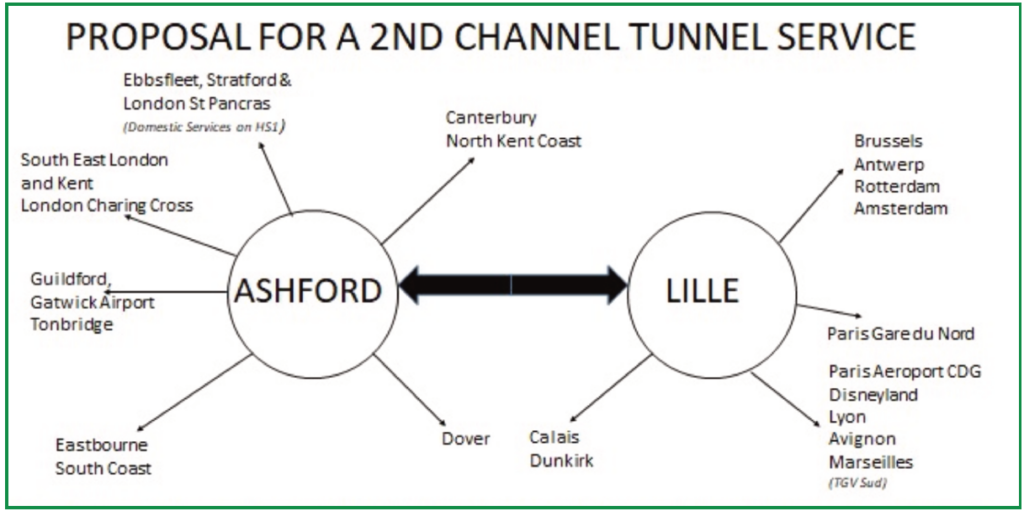Railfuture’s European passenger group member Dennis Fancett was part of a delegation of European Passengers’ Federation members which met the senior management of the now merged Eurostar – Thalys group on 13 January 2023.
Ticket prices on Eurostar are now significantly higher than pre-Covid levels. Calls at stations such as Ebbsfleet and Ashford have been withdrawn, as have direct services to Disneyland and Avignon. Through ticketing to non-Eurostar destinations such as UK cities outside London, which at a previous meeting in March 2019 Eurostar said had been dropped due to a temporary glitch in its at-the-time new booking system and would be reinstated within a few months, have never in fact returned, and show no signs of doing so.
For its part, Eurostar has pointed out that the additional post-Brexit border checks means it cannot get passengers through key terminals such as St Pancras and Gare du Nord fast enough.
In response, and unlike the airlines which were completely unable to cope with the post-Covid bounce back, with passengers missing flights and flights being cancelled on the day, Eurostar has both reduced the number of services running, and the number of seats it sells on each train.
All this leaves Eurostar in a significant financial predicament.
The company is quick to point out that it received no financial support from the UK government at all during Covid, though observers would be aware that Eurostar was already in significant financial trouble before the pandemic began. Nevertheless, the company now has a robust recovery plan in place. This includes sticking to its core capital-to-capital routes only. Doing anything else is seen as a distraction of management effort and focus and, Eurostar made clear, is not going to happen in the short term. Before the meeting, Railfuture had prepared a paper, acknowledging Eurostar’s problems but also putting forward some practical suggestions.
For instance, noting that Eurostar simply cannot get enough passengers through border control at St Pancras in time, Railfuture suggested the station at Stratford, originally designed to serve Eurostar but which has never done so, might be brought into use. The station has excellent connections to both the City of London and with the Elizabeth line now open, the West End and West London too. It would be possible to fill the trains and run at capacity if half a train load joins at St Pancras and the other half joins at Stratford. Ebbsfleet is more problematic because of its lack of connections to central London, but Railfuture suggested a deal might be explored with government in which Eurostar reintroduces this station if the Elizabeth line is extended beyond AbbeyWood to Ebbsfleet as once intended.
Railfuture also suggested a new Ashford-Lille shuttle might be introduced, making use of Eurostar units currently being left in sidings as the company is not running a full service at present.
The thinking behind this proposal is more than to serve the conurbations of Ashford and Lille alone, but to promote, with through ticketing, the excellent onward rail connections both stations offer. On the UK side this includes Gatwick, Tonbridge, Dover, and Ebbsfleet (avoiding the need for north Kent passengers to travel into London and then back out). On the continent, onward connections with through ticketing could serve Brussels, Paris and the south of France.
It has to be said that this proposal was rejected by Eurostar immediately, which does of course leave Railfuture and EPF free to explore it with other open access operators.
In summary, however, it was clear Eurostar’s senior managers had studied Railfuture’s proposals carefully. As such it was a positive meeting. While nothing was committed to, proposals other than Ashford-Lille were not rejected either, and quite possibly remain under genuine consideration and evaluation within the company.
Perhaps the biggest ray of hope relates to through ticketing. It is difficult to understand why Eurostar has not embraced this, as it represents no additional operational cost, although there would be some liability for missed connections in the event of delay. With Eurostar and Thalys now a single operation, Railfuture did detect an acceptance that something needs to move here. So we might expect through ticketing to be reintroduced on the European side before the UK side.
The announcement of a new service from Berlin to Brussels by open access operator European Sleeper, with onward connections to London, may have been a bit of a wake-up call for Eurostar. However, Railfuture has examined European Sleeper’s proposals, and welcome as the service would be, based on the information published so far, it will not offer through ticketing to and from London, and on the homeward side, the inter-connection time of just 24 minutes at Brussels is regarded as hopelessly inadequate to make the suggested connection allowing arrival in London by 1100.
Other things were discussed at the meeting too. London Travelwatch raised some issues relating to customer service policy, and European colleagues also raised some Thalys-specific issues, though it was cross-channel services that took up most of the discussion time.
A further meeting will be held in a year’s time, and meanwhile, specialist Eurostar-EPF sub-groups may be set up to look at specific issues – through ticketing and connections being examples.
A slightly different version of Railfuture’s paper was also sent to the House of Commons transport select committee. This followed a submission from Eurostar itself and a follow up response from ALLRAIL (the Alliance of Passenger Rail New Entrants in Europe).
However, Railfuture has not received a response from the select committee so far.
(Article to be publish in railwatch – April 2023 issue)



 Stay informed!
Stay informed!